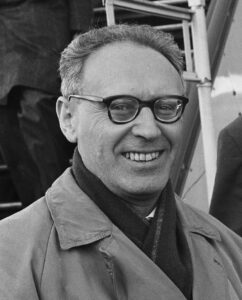FIDE World Chess Championship 1951
← Previous | Timeline | Next →
The FIDE World Chess Championship 1951 was held in Moscow, Soviet Union, between reigning champion Mikhail Botvinnik and challenger David Bronstein, both representing the USSR. The 24-game match ended 12–12, so Botvinnik retained the title under the rules in force.

Photographer: Harry Pot / Anefo (License: CC BY-SA 3.0 NL) via Wikimedia Commons
Winner: Mikhail Botvinnik
Born: 17 August 1911, Kuokkala, Russian Empire (now Repino, Russia)
Died: 5 May 1995, Moscow, Russia
Mikhail Botvinnik entered the 1951 championship as the inaugural FIDE World Champion, having secured the title in 1948. Renowned for his scientific approach, he blended meticulous preparation with positional depth and a pioneering interest in computer chess. By 1951, he was the towering figure of the Soviet chess school, revered not just as a player but as a symbol of Soviet intellect. The match was tense—Botvinnik faltered in sharp, dynamic positions but showed remarkable resilience under pressure. Though many felt Bronstein had been more creative, the 12–12 result let Botvinnik retain the title. His reputation as an organiser and theoretician grew further after the match, and he continued to mentor a new generation of Soviet grandmasters. His legacy as a strategist and statesman of chess was secure, and he later expressed deep respect for his opponent:
«His creativity and unpredictability made him an extremely difficult opponent.» — Mikhail Botvinnik

Photographer: Eric Koch / Anefo (License: CC BY-SA 3.0 NL) via Wikimedia Commons
Opponent: David Bronstein
Born: 19 February 1924, Bila Tserkva, Ukrainian SSR (now Ukraine)
Died: 5 December 2006, Minsk, Belarus
David Bronstein was one of the most imaginative and daring players of his generation. With a flair for tactical ingenuity and creative risk-taking, he rose swiftly through the Soviet ranks and earned his title shot by winning the 1950 Candidates Tournament. In the 1951 match, he led 11.5–10.5 before faltering in the final two games—a collapse often attributed to nerves, fatigue, or external pressure. Bronstein’s unorthodox strategies and intuitive sense of initiative made him a formidable and unpredictable challenger. His inventive ideas reshaped modern opening theory and midgame play, and his later writings—especially on Zurich 1953—cemented his reputation as a bold thinker who remained an influential and unconventional force in chess for decades. He later reflected on the psychological burden of that match:
«I was not afraid of Botvinnik. I was afraid of losing to him. And there is a difference.» — David Bronstein
Match Overview
Match Dates: March 16 – May 11, 1951
Location: Moscow, Soviet Union
Format: 24 games; champion retained the title in case of a tie
Time Control: 40 moves in 2½ hours, then 16 moves per hour
Prize Fund: State-sponsored; modest but significant, highlighting the symbolic value rather than financial stakes
Main Sponsors: Soviet State Committee for Physical Culture and Sport; Chess Section of the USSR Sports Federation
Historical and Cultural Context
The 1951 championship was the first world title match organized by FIDE. Staged in Moscow, it reflected the USSR’s central role in post-war chess and drew extensive domestic coverage. Within the match, Bronstein led 11½–10½ before Botvinnik equalized. Debates about practical chances in the final phase have appeared in later commentary, but the official result was a 12–12 tie and the champion retained his title.

World Chess Championship 1951 Games
Game 1
Game 2
Game 3
Game 4
Game 5
Game 6
Game 7
Game 8
Game 9
Game 10
Game 11
Game 12
Game 13
Game 14
Game 15
Game 16
Game 17
Game 18
Game 19
Game 20
Game 21
Game 22
Game 23
Game 24
FIDE World Chess Championship 1951
Mikhail Botvinnik, Soviet Union
← Previous | Timeline | Next →
FIDE World Chess Championship 1951 Games
Quote Sources
- David Bronstein: The Sorcerer’s Apprentice
- Mikhail Botvinnik: Achieving the Aim
General Sources
- FIDE Archives: Official match records and data
- ChessBase: Contemporary reporting and analysis
- Wikipedia: World Chess Championship 1951
- Wikipedia: Mikhail Botvinnik biography
- Wikipedia: David Bronstein biography
- New in Chess Archives: Historical features and reprints
- Pravda Archive (USSR): [Contemporary Soviet coverage] (archive-only)
- British Chess Magazine (1951 editions, archive-only)
- Shakhmaty v SSSR: [1951 issues] (archive-only, Russian)
- Internet Archive: Historical chess books and records
- Google Books: Searchable previews of key publications
Photo Credits
Mikhail Botvinnik at Schiphol Airport, 1962
Photographer: Harry Pot / Anefo (License: CC BY-SA 3.0 NL) via Wikimedia Commons
Date: 29 October 1962
David Bronstein at the IBM Chess Tournament, 1968
Photographer: Eric Koch / Anefo (License: CC BY-SA 3.0 NL) via Wikimedia Commons
Date: 16 July 1968
Sources, image credits, and attributions for this championship are listed on this page. For general information about the World Chess Champions timeline, visit the main page.